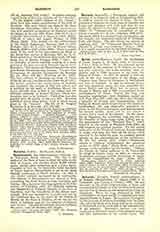

Barral, LOUIS-MATHIAS, COUNT DE, Archbishop of Tours, France, b. April 26, 1746, at Grenoble; d. June 7, 1816, at Paris. He was educated for the priesthood at the seminary of St. Sulpice, in Paris, and after ordination was made secretary, then coadjutor, and in 1790, successor, to his uncle, the Bishop of Troyes. In 1791, he refused to take the oath to the civil constitution of the clergy, and withdrew from France to Constance in Switzerland and later to England. In 1801 he returned home, and was appointed, under the new concordat between France and the Holy See, to govern the Diocese of Meaux, and in 1805 was promoted to the Archbishopric of Tours. During the long and harassing negotiations which Napoleon carried on with Pope Pius VII, while the latter was virtually a prisoner at Savona and Fontainebleau, Archbishop de Barral acted frequently as the emperor’s intermediary. He was afterwards appointed almoner to the Empress Josephine, and he pronounced her funeral oration. Later still he was named a senator and a count of the Empire. On the downfall of Napoleon, the archbishop took his seat in the Chamber of Peers under Louis XVIII, and in the government of the “Hundred Days”, which followed on the return of Napoleon from Elba, he still retained his political position. On the second restoration of the Bourbons, however, he was obliged to resign, and from this time till his death, which occurred in the following year, he confined himself entirely to the administration of his archdiocese. He has left among other works:—”Fragments relatifs a l’histoire ecclesiastique des premieres annees du XIXe siecle” (Paris, 1814); and a posthumous work, published by his brother: “Defense des libertds de l’eglise gallicane et de l’assemblee du clergy de France tenue en 1682, ou refutation de plusieurs ouvrages publics recemment en Angleterre sur l’infaillibilitt du Pape” (Paris, 1817).
EDWARD A. GILLIGAN

